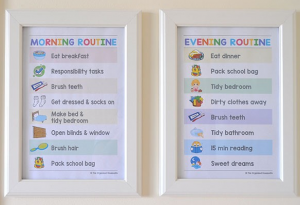5 Little Changes That’ll Make a Big Difference With Your Child Care Routine
Child care is a saving grace for busy parents but routines that are all over the place causes unnecessary stress. Little changes can do a lot, so here’s five key areas where you can make simple adjustments.
Food
Kids are hungry because their little bodies are growing. But sometimes you’re faced with a stubborn child who won’t eat breakfast…only to use the ‘I’m hungry’ line in the car. The solution? Pack a go-bag with some healthy snacks like a squeezy yogurt, cheese and fruit.
Also have some fun, after school snacks ready for when you get home. We’ve already written about some healthy options. But some sweet treats like pikelets and jam go down equally as well.

Transport
These days most families have two working parents, even if one is part-time. Other parents at the child care centre are in the same boat. Adults at the daycare meet each other mostly through their children, and feel comfortable enough after a period to share ‘drive to day care’ duties.
Home routine
Yes, it’s important to have this at home otherwise nobody would be getting any sleep. Super Nanny Jo Frost is the queen of setting routines. She says routines revolve around activities and time; eating sleeping and playing.
Have a routine chart set up a home, something colourful your child can follow easily. This will include meal times, bath times, homework and even something as small as making the bed. Once you get into the rhythm of routine, daily life flows a lot more smoothly.

Ask the carers
Child care workers see what’s going on; it’s their job to care for your child as best they can. The National Quality Standards outline how carers need to monitor children’s development and make regular reports.
If you’ve noticed your son or daughter’s personality change somewhat, that they’re upset or withdrawn, ask the staff at the child care centre. What they tell you could be enlightening.
Ask your children
That being said, though, it’s a good idea to try and approach your children first. They might not tell you the whole truth or be afraid to tell you what’s bothering them. Kids become confident when they know it’s okay to express how they feel, but you need to give them the opportunity.
More articles you might be interested in
6 easy, yummy recipes for hungry kids after kindergarten
Save time on your morning school run with these tips

